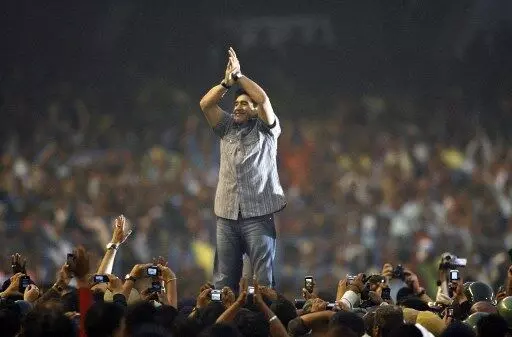The life of Maradona was his own unwritten Bible: a rebel who was born 60 years ago in Villa Fiorito, a poor district in Buenos Aires, was a close friend of other rebels liks Cuban leader Fidel Castro and Venezuelan Hugo Chávez, and who conquered all the awards that a soccer player may dream in his life.
He had it all, but he was a sad kind of divinity. For him, it was never enough. He reached the highest of the wordly skies but he also visited the deepest hell. He survived many addictions – drugs, alcohol, pills- a stomach surgery to reduce his obesity and also a recent brain surgery. His heart was functioning at 38% of his capacity. But we, as Argentinians, thought that Maradona will last forever.
Wherever Maradona put his feet, there was fire, ovation and scandal. Each time he opened his mouth, the media got shocked. The politicians were frightened about him. Other soccer players were frightened too. Even in his last days, when Maradona was an old kind of divinity, he may put up or down a public figure, just by telling what he thought about him. And he never kept quiet.
For we, there will be no other like him any more. He even has in the city of Rosario, in Santa Fe province, his own chapel in the Maradonian Church. The so-called priest married many a couple in the name of Diego. No matter what they said, he took it seriously.
Even though he was ill, depressed and with a lot of familiar conflicts on his shoulders – ex wives fighting with each other, illegal sons claiming to become members of his family-, the news about his death, took by surprise everyone in Argentina. Many journalists in local television shows, who announced his death broke into tears. The president Alberto Fernández, announced three days of mourning and prepared everything for receiving his corpse in Casa Rosada, the government house, where his public funeral, took place with a million people visiting him for their final farewell.
This week, Maradona was recovering from a brain surgery, and living with very close friends. "I don't know If people will keep loving me", he said in one of his last interviews. Since the death of his mother, he had been depressed and nostalgic. He found it hard even to speak.
His last work was as a coach of Gimnasia Esgrima de La Plata, a small soccer club in Argentina. But from time to time, he announced he would quit, but later he was back in the job again. That was typical in Maradona. Like many of the Greek gods, we was a living contradiction.
He spoke about how it hurts to see poor people living in the streets, but on the other hand, he spent millions during his life in drugs and void amusement. He said that for him, the first value was the family, but he had many problems even with his own children.
He was, without any doubt the best in the soccer field. But, outside the stadiums, he was a lonesome troublesome man. No matter what he said or did, Argentinians love him with a unique feeling. They printed tattoos with his name, his face, his signature or they just put: G10D. And everyone would know who they were talking about.
These are the saddest days for Argentinians. Without Maradona, here the magic is lost. Even though Lionel Messi is a great player like he was, he doesn't have the skills to appeal to the divinity office. People love Messi but, since he made all his career in Barcelona, in Spain, far from Argentina, they find it hard to feel about him as an Argentinian.
But Maradona, on the other hand, has the essence of our local DNA: a little bit of tango nostalgia, a little bit of the rebellious, a little bit of talented gift, and a lot of troubles to deal with. The unwritten Bible of Maradona is, in many ways, the story of our own country. And this week, the unexpected apocalypse occurred. What will come next, nobody knows.


















